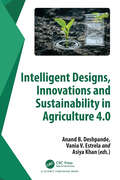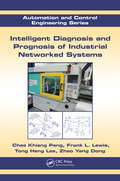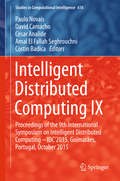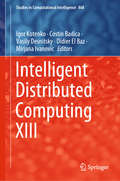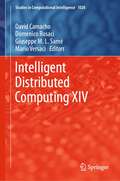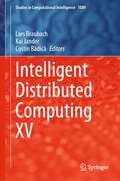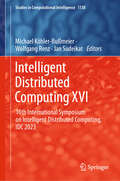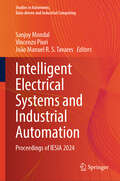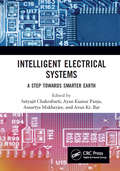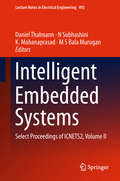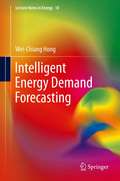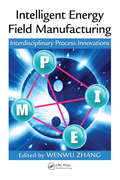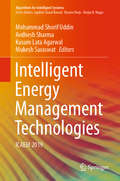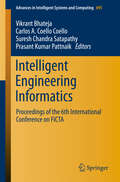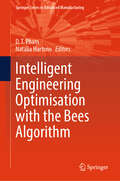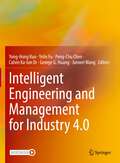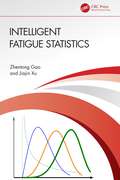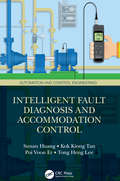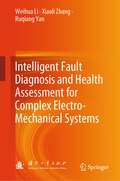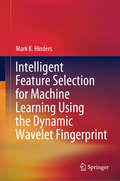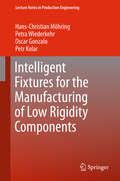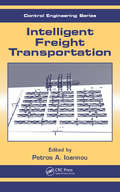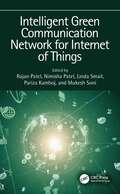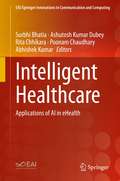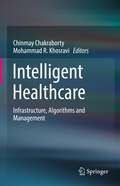- Table View
- List View
Intelligent Designs, Innovations and Sustainability in Agriculture 4.0
by Vania V. Estrela Anand B. Deshpande Asiya KhanFeeding an expanding population in light of environmental preservation and keeping production lean is a considerable challenge. Sustainable and Precise Agriculture relying on Industry 4.0 (Agri4) points toward creating strategic collaborations, innovations, and alternative approaches to old concerns, and incorporating solutions from other expertise domains. It requires intensive efforts from governments, investors, investigators, and developers. These initiatives address many problems while connecting more agrarians and their communities. Agri4 entails key agribusiness developments, viz. precision agriculture, biotech, IoT, and Big Data, to augment efficiency in dealing with growing population and climate change. Agri4 is likely to yield improvements such as sustainable practices education, environmental residue reduction, seed improvement, and traditional agricultural knowledge usage, among others. It promotes sustainable food production, community development, and scientific literacy by fostering effective natural resource administration.This book explores the transformative impact of Agriculture 4.0, guiding readers through the integration of digital technologies and sustainable practices into modern farming. It discusses how innovations like AI and the IoT are revolutionizing agriculture, enhancing connectivity, precision, and ecological awareness. The intended readers of the book include agricultural professionals, researchers, tech innovators, policymakers, and students. It caters to those interested in the convergence of modern technology and farming, particularly in advancing sustainable practices and understanding the future of agriculture in the digital age.
Intelligent Diagnosis and Prognosis of Industrial Networked Systems (Automation and Control Engineering #44)
by Tong Heng Lee Frank L. Lewis Chee Khiang Pang Zhao Yang DongIn an era of intense competition where plant operating efficiencies must be maximized, downtime due to machinery failure has become more costly. To cut operating costs and increase revenues, industries have an urgent need to predict fault progression and remaining lifespan of industrial machines, processes, and systems. An engineer who mounts an acoustic sensor onto a spindle motor wants to know when the ball bearings will wear out without having to halt the ongoing milling processes. A scientist working on sensor networks wants to know which sensors are redundant and can be pruned off to save operational and computational overheads. These scenarios illustrate a need for new and unified perspectives in system analysis and design for engineering applications. Intelligent Diagnosis and Prognosis of Industrial Networked Systems proposes linear mathematical tool sets that can be applied to realistic engineering systems. The book offers an overview of the fundamentals of vectors, matrices, and linear systems theory required for intelligent diagnosis and prognosis of industrial networked systems. Building on this theory, it then develops automated mathematical machineries and formal decision software tools for real-world applications. The book includes portable tool sets for many industrial applications, including: Forecasting machine tool wear in industrial cutting machines Reduction of sensors and features for industrial fault detection and isolation (FDI) Identification of critical resonant modes in mechatronic systems for system design of R&D Probabilistic small-signal stability in large-scale interconnected power systems Discrete event command and control for military applications The book also proposes future directions for intelligent diagnosis and prognosis in energy-efficient manufacturing, life cycle assessment, and systems of systems architecture. Written in a concise and accessible style, it presents tools that are mathematically rigorous but not involved. Bridging academia, research, and industry, this reference supplies the know-how for engineers and managers making decisions about equipment maintenance, as well as researchers and students in the field.
Intelligent Distributed Computing IX
by Amal El Fallah Seghrouchni Costin Badica Paulo Novais David Camacho Cesar AnalideThis book represents the combined peer-reviewed proceedings of the ninth International Symposium on Intelligent Distributed Computing - IDC'2015, of the Workshop on Cyber Security and Resilience of Large-Scale Systems - WSRL'2015, and of the International Workshop on Future Internet and Smart Networks - FI&SN'2015. All the events were held in Guimarães, Portugal during October 7th-9th, 2015. The 46 contributions published in this book address many topics related to theory and applications of intelligent distributed computing, including: Intelligent Distributed Agent-Based Systems, Ambient Intelligence and Social Networks, Computational Sustainability, Intelligent Distributed Knowledge Representation and Processing, Smart Networks, Networked Intelligence and Intelligent Distributed Applications, amongst others.
Intelligent Distributed Computing XIII (Studies in Computational Intelligence #868)
by Costin Badica Igor Kotenko Mirjana Ivanovic Vasily Desnitsky Didier El BazThis book gathers research contributions on recent advances in intelligent and distributedcomputing. A major focus is placed on new techniques and applications for several highlydemanded research directions: Internet of Things, Cloud Computing and Big Data, Data Mining and Machine Learning, Multi-agent and Service-Based Distributed Systems, Distributed Algorithms and Optimization, Modeling Operational Processes, Social Network Analysis and Inappropriate Content Counteraction, Cyber-Physical Security and Safety, Intelligent Distributed Decision Support Systems, Intelligent Human-Machine Interfaces, VisualAnalytics and others. The book represents the peer-reviewed proceedings of the 13thInternational Symposium on Intelligent Distributed Computing (IDC 2019), which was held in St. Petersburg, Russia, from October 7 to 9, 2019.
Intelligent Distributed Computing XIV (Studies in Computational Intelligence #1026)
by David Camacho Mario Versaci Domenico Rosaci Giuseppe M. L. SarnéThis book collects 43 regular papers received from 18 countries that present innovative advances in intelligent and distributed computing, encompassing both architectural and algorithmic results related to these fields. Significant attention is given to new models, techniques, and applications for distributed intelligent architectures and high-performance architectures, machine learning techniques, Internet of Things, blockchain, intelligent transport systems, data analytics, trust and reputation systems, and many others. The book includes the peer-reviewed proceedings of the 14th International Symposium on Intelligent Distributed Computing (IDC 2021), which was held in online mode due to the COVSARS2 pandemic situation, during September 16–18, 2021. The IDC 2021 event included sessions on Internet of Things, data analytics, machine learning, multi-agent systems, algorithms, future intelligent transport solutions, blockchain, intelligent distributed computing for cyber-physical security, and security and trust and reputation in intelligent environments.
Intelligent Distributed Computing XV (Studies in Computational Intelligence #1089)
by Costin Bădică Lars Braubach Kai JanderThis book includes the latest research in the diverse field of intelligent distributed computing, covering a multitude of aspects in both distributed computing and intelligent systems. It includes contributions in machine learning, distributed systems & agents, text- and research-centric applications, social systems, and smart cities. It was written by leading experts in the field, who presented their work as part of the 15th International Symposium on Intelligent Distributed Computing (IDC 2022).
Intelligent Distributed Computing XVI: 16th International Symposium on Intelligent Distributed Computing, IDC 2023 (Studies in Computational Intelligence #1138)
by Michael Köhler-Bußmeier Wolfgang Renz Jan SudeikatThis book presents selected contributions to the 16th Symposium on Intelligent Distributed Computing (IDC’23) held from September 13 to 15, 2023, at the HAW Hamburg, Germany. This unique collection of papers presents the latest findings, research achievements and ideas in the area of Intelligent Distributed Computing provided by researchers and practitioners from both distributed computing and intelligent computing communities. Distributed computing covers methods and technology to build complex computational systems composed of collaborating software components scattered across diverse computational elements. Intelligent computing offers a hybrid palette of methods, techniques and their applications ranging from classical artificial intelligence, information and data sciences, multi-agent technologies or computational intelligence to more recent trends such as swarm intelligence, bio-inspired computation, cloud computing, machine learning or social/cyber-physical trust and security.
Intelligent Electrical Systems and Industrial Automation: Proceedings of IESIA 2024 (Studies in Autonomic, Data-driven and Industrial Computing)
by Vincenzo Piuri João Manuel R. S. Tavares Sanjoy MondalThis book features high-quality research papers presented at the International Conference on Intelligent Electrical Systems & Industrial Automation (IESIA 2024), organized by Department of Electrical Engineering, Electrical and Electronics Engineering, Institute of Engineering & Management, Kolkata, India during April 5 – 7, 2024. The volume presents diverse range of topics, including smart sensors, automation control algorithms, energy-efficient solutions, and real-time data analytics.
Intelligent Electrical Systems: A Step towards Smarter Earth (Conference Proceedings Series on Information and Communications Technology)
by Satyajit Chakrabarti; Ayan Kumar Panja; Amartya Mukherjee; Arun Kr. BarThe conference aims to provide a premier platform for Engineers, researchers, scientists and academicians to present their work in the emerging areas such as Renewable Energy, Energy storage, Power Electronics & drives, Smart devices and communication systems, Artificial Intelligence, Robotics, Networks an IoT, Control and automation etc.
Intelligent Embedded Systems: Select Proceedings of ICNETS2, Volume II (Lecture Notes in Electrical Engineering #492)
by Daniel Thalmann N Subhashini K. Mohanaprasad M S Bala MuruganThis book is a collection of papers from international experts presented at the International Conference on NextGen Electronic Technologies (ICNETS2). ICNETS2 encompassed six symposia covering all aspects of electronics and communications engineering, including relevant nano/micro materials and devices. Highlighting recent research in intelligent embedded systems, the book is a valuable resource for professionals and students working in the core areas of electronics and their applications, especially in signal processing, embedded systems, and networking. The contents of this volume will be of interest to researchers and professionals alike.
Intelligent Energy Demand Forecasting
by Wei-Chiang HongAs industrial, commercial, and residential demands increase and with the rise of privatization and deregulation of the electric energy industry around the world, it is necessary to improve the performance of electric operational management. Intelligent Energy Demand Forecasting offers approaches and methods to calculate optimal electric energy allocation to reach equilibrium of the supply and demand. Evolutionary algorithms and intelligent analytical tools to improve energy demand forecasting accuracy are explored and explained in relation to existing methods. To provide clearer picture of how these hybridized evolutionary algorithms and intelligent analytical tools are processed, Intelligent Energy Demand Forecasting emphasizes on improving the drawbacks of existing algorithms. Written for researchers, postgraduates, and lecturers, Intelligent Energy Demand Forecasting helps to develop the skills and methods to provide more accurate energy demand forecasting by employing novel hybridized evolutionary algorithms and intelligent analytical tools.
Intelligent Energy Field Manufacturing: Interdisciplinary Process Innovations
by Wenwu ZhangEdited by prominent researchers and with contributions from experts in their individual areas, Intelligent Energy Field Manufacturing: Interdisciplinary Process Innovations explores a new philosophy of engineering. An in-depth introduction to Intelligent Energy Field Manufacturing (EFM), this book explores a fresh engineering methodology that not only integrates but goes beyond methodologies such as Design for Six Sigma, Lean Manufacturing, Concurrent Engineering, TRIZ, green and sustainable manufacturing, and more. This book gives a systematic introduction to classic non-mechanical manufacturing processes as well as offering big pictures of some technical frontiers in modern engineering.The book suggests that any manufacturing process is actually a process of injecting human intelligence into the interaction between material and the various energy fields in order to transfer the material into desired configurations. It discusses technological innovation, dynamic M-PIE flows, the generalities of energy fields, logic functional materials and intelligence, the open scheme of intelligent EFM implementation, and the principles of intelligent EFM. The book takes a highly interdisciplinary approach that includes research frontiers such as micro/nano fabrication, high strain rate processes, laser shock forming, materials science and engineering, bioengineering, etc., in addition to a detailed treatment of the so called "non-traditional" manufacturing processes, which covers waterjet machining, laser material processing, ultrasonic material processing, EDM/ECM, etc. Filled with illustrative pictures, figures, and tables that make technical materials more absorbable, the book cuts across multiple engineering disciplines. The majority of books in this area report the facts of proven knowledge, while the behind-the-scenes thinking is usually neglected. This book examines the big picture of manufacturing in depth before diving into the deta
Intelligent Energy Management Technologies: ICAEM 2019 (Algorithms for Intelligent Systems)
by Mohammad Shorif Uddin Avdhesh Sharma Kusum Lata Agarwal Mukesh SaraswatThis book is a collection of best selected high-quality research papers presented at the International Conference on Advances in Energy Management (ICAEM 2019) organized by the Department of Electrical Engineering, Jodhpur Institute of Engineering & Technology (JIET), Jodhpur, India, during 20–21 December 2019. The book discusses intelligent energy management technologies which are cost effective compared to the high cost of fossil fuels. This book also explains why these systems have beneficial impact on environmental, economic and political issues of the world. The book is immensely useful for research scholars, academicians, R&D institutions, practicing engineers and managers from industry.
Intelligent Engineering Informatics: Proceedings Of The 6th International Conference On Ficta (Advances In Intelligent Systems And Computing #695)
by Suresh Chandra Satapathy Vikrant Bhateja Prasant Kumar Pattnaik Carlos A. Coello CoelloThis book presents the proceedings of the 6th International Conference on Frontiers of Intelligent Computing: Theory and Applications (FICTA 2017), held in Bhubaneswar, Odisha. The event brought together researchers, scientists, engineers, and practitioners to exchange their new ideas and experiences in the domain of intelligent computing theories with prospective applications to various engineering disciplines. The book is divided into two volumes: Information and Decision Sciences, and Intelligent Engineering Informatics. This volume covers broad areas of Intelligent Engineering Informatics, with papers exploring both the theoretical and practical aspects of various areas like ANN and genetic algorithms, human–computer interaction, intelligent control optimisation, intelligent e-learning systems, machine learning, mobile computing, multi-agent systems, etc. The book also offers a valuable resource for students at the post-graduate level in various engineering disciplines.
Intelligent Engineering Optimisation with the Bees Algorithm (Springer Series in Advanced Manufacturing)
by D. T. Pham Natalia HartonoThis book presents new and advanced results and developments related to the Bees Algorithm, along with its application to a wide range of engineering problems. Modern complex processes and systems are difficult to optimise using conventional mathematical tools as they require models that often cannot be obtained with accuracy or certainty. Optimising such systems demands efficient, model-free optimisation tools. The Bees Algorithm, a swarm-based technique inspired by the foraging behaviour of honeybees, is an ideal tool for tackling challenging optimisation problems. The algorithm is conceptually elegant and extremely easy to apply. All it needs to solve an optimisation problem is a means to evaluate the quality of potential solutions. While the covered applications belong to diverse engineering fields, this book’s focus is on advanced manufacturing and industrial engineering. The book comprises two parts. The first part explores different enhancements made to the original Bees Algorithm to improve its performance. The second part delves into the algorithm's applications in design, manufacturing, production, ergonomics, logistics, transportation, and electrical and electronic engineering. By showcasing the variety of optimisation tasks successfully handled using the Bees Algorithm, the book aims to inspire and motivate engineers and researchers worldwide to adopt the algorithm as a powerful and versatile tool for conquering complex engineering problems in the Industry 4.0 era and beyond.
Intelligent Engineering and Management for Industry 4.0
by Yelin Fu Yong-Hong Kuo Peng-Chu Chen Calvin Ka-lun Or George G. Huang Junwei WangIndustry 4.0 is changing how we manage operations to drive systems more intelligently. Technologies and applications are rapidly evolving. Disruptive technologies, such as artificial intelligence, big data, cloud computing and digital twin, are shaking up different industries and have motivated us to revisit engineering and management tools for improving system design, efficiency, effectiveness, reliability, and responsiveness. While these emerging technologies have powered new applications, novel industrial engineering methodologies are required to achieve the goals.Industrial Engineering was sprouted from major engineering disciplines that called for better professional understanding of industrialization. Ever since, the discipline of Industrial Engineering has been the star role player in confronting emerging industries; be it manufacturing, service, high tech products, outer space technology, information technology, industrial policy, ergonomics, and now the world’s greatest concern, sustainable development.This book presents the state-of-the-art in industrial engineering research from different countries and cities around the globe. The book covers a wide range of topics in industrial engineering, including: Demand Chain Management, E-business / Information Technology, Evolutionary Algorithm, Green Manufacturing/Management, Health Care Systems and more.
Intelligent Fatigue Statistics
by Zhentong Gao Jiajin XuThis book introduces the principles and theories of fatigue statistics and presents the Zhentong Gao method along with its practical applications.Fatigue in metal components is a complex phenomenon and an important issue because the fatigue life of key components often determines the overall lifespan of the aircraft. The book provides an overview and analysis of existing fatigue life calculation and estimation methods, including probability statistical methods such as using Gaussian distribution, logarithmic Gaussian distribution, and Weibull distribution to fit actual data. However, the authors argue that these methods have limitations in terms of reliability and applicability. They point out that the location parameter of the Weibull distribution represents a safe life with 100% reliability. Based on these methods, the book proposes the intelligent Zhentong Gao method, which differs from traditional approaches and effectively addresses and solves the problem of estimating the three parameters of Weibull distribution.This title will serve as a valuable reference for researchers, senior undergraduate and graduate students, and engineers in the fields of aerospace, automotive, mechanical, civil engineering, etc.
Intelligent Fault Diagnosis and Accommodation Control (Automation and Control Engineering)
by Tong Heng Lee Kok Kiong Tan Sunan Huang Poi Voon ErControl systems include many components, such as transducers, sensors, actuators and mechanical parts. These components are required to be operated under some specific conditions. However, due to prolonged operations or harsh operating environment, the properties of these devices may degrade to an unacceptable level, causing more regular fault occurrences. It is therefore necessary to diagnose faults and provide the fault-accommodation control which compensates for the fault of the component by substituting a configuration of redundant elements so that the system continues to operate satisfactorily. In this book, we present a result of several years of work in the area of fault diagnosis and fault-accommodation control. It aims at information estimate methods when faults occur. The book uses the model built from the plant or process, to detect and isolate failures, in contrast to traditional hardware or statistical technologies dealing with failures. It presents model-based learning and design technologies for fault detection, isolation and identification as well as fault-tolerant control. These models are also used to analyse the fault detectability and isolability conditions and discuss the stability of the closed-loop system. It is intended to report new technologies in the area of fault diagnosis, covering fault analysis and control strategies of design for various applications. The book addresses four main schemes: modelling of actuator or sensor faults; fault detection and isolation; fault identification, and fault reconfiguration (accommodation) control. It also covers application issues in the monitoring control of actuators, providing several interesting case studies for more application-oriented readers.
Intelligent Fault Diagnosis and Health Assessment for Complex Electro-Mechanical Systems
by Ruqiang Yan Weihua Li Xiaoli ZhangBased on AI and machine learning, this book systematically presents the theories and methods for complex electro-mechanical system fault prognosis, intelligent diagnosis, and health state assessment in modern industry. The book emphasizes feature extraction, incipient fault prediction, fault classification, and degradation assessment, which are based on supervised-, semi-supervised-, manifold-, and deep learning; machinery degradation state tracking and prognosis by phase space reconstruction; and complex electro-mechanical system reliability assessment and health maintenance based on running state info. These theories and methods are integrated with practical industrial applications, which can help the readers get into the field more smoothly and provide an important reference for their study, research, and engineering practice.
Intelligent Feature Selection for Machine Learning Using the Dynamic Wavelet Fingerprint
by Mark K. HindersThis book discusses various applications of machine learning using a new approach, the dynamic wavelet fingerprint technique, to identify features for machine learning and pattern classification in time-domain signals. Whether for medical imaging or structural health monitoring, it develops analysis techniques and measurement technologies for the quantitative characterization of materials, tissues and structures by non-invasive means. Intelligent Feature Selection for Machine Learning using the Dynamic Wavelet Fingerprint begins by providing background information on machine learning and the wavelet fingerprint technique. It then progresses through six technical chapters, applying the methods discussed to particular real-world problems. Theses chapters are presented in such a way that they can be read on their own, depending on the reader’s area of interest, or read together to provide a comprehensive overview of the topic. Given its scope, the book will be of interest to practitioners, engineers and researchers seeking to leverage the latest advances in machine learning in order to develop solutions to practical problems in structural health monitoring, medical imaging, autonomous vehicles, wireless technology, and historical conservation.
Intelligent Fixtures for the Manufacturing of Low Rigidity Components
by Hans Christian Moehring Petra Wiederkehr Oscar Gonzalo Petr KolarThe book summarizes the results of the European research project "Intelligent fixtures for the manufacturing of low rigidity components" (INTEFIX). The structure of the book follows the sub-projects which are dedicated to case studies within the scenarios "vibrations", "deformations" and "positioning". The INTEFIX project deals with the development and analysis of several exemplary types of intelligent, sensor and actuator integrated fixtures for the clamping of sensitive workpieces in cutting machine tools. Thus, the book gives a representative overview about this innovative field of technology. The demands of the case studies are described and the technological approaches and solutions are introduced. Furthermore, innovative methods for the design and optimization of intelligent fixtures are presented.
Intelligent Freight Transportation
by Petros A. IoannouIncreasing capacity at ports and goods movement in the supply chain in general, while also satisfying environmental, economic, political, labor union, and other constraints is, arguably, the greatest challenge of modern transportation. With space at a premium and costs through the roof, it is increasingly obvious that the traditional solutions are
Intelligent Green Communication Network for Internet of Things
by Rajan Patel Nimisha Patel Linda Smail Pariza Kamboj Mukesh SoniThe text covers the advanced and innovative concept of green communication networks using the Internet of Things in different fields including cloud technology, agriculture, the automobile sector, and robotics. It will also help readers in learning the efficient use of sensors and devices in the Internet of Things networks. The text covers 5G communication and its application for intelligent and green network-enabled Internet of Things. This book • Discusses intelligent and green networking-enabled Internet of Things • Covers architectures and models for intelligent and green communication networks-enabled Internet of Things • Discusses designing Internet of Things devices that help in reducing the emissions of CO2 in the environment and energy consumption • Highlights green computing approach and green communication network designs and implementations for Internet of Things ecosystem • Includes studies on energy-aware systems, technologies, and green communication This book comprehensively discusses recent advances and applications in the area of green Internet of Things communication in a single volume. It will serve as an ideal reference text for senior undergraduate and graduate students, and academic researchers in the fields of electrical engineering, electronics and communication engineering, computer engineering, and information technology. .
Intelligent Healthcare: Applications of AI in eHealth (EAI/Springer Innovations in Communication and Computing)
by Abhishek Kumar Ashutosh Kumar Dubey Surbhi Bhatia Poonam Chaudhary Rita ChhikaraThis book fosters a scientific debate for sophisticated approaches and cognitive technologies (such as deep learning, machine learning and advanced analytics) for enhanced healthcare services in light of the tremendous scope in the future of intelligent systems for healthcare. The authors discuss the proliferation of huge data sources (e.g. genomes, electronic health records (EHRs), mobile diagnostics, and wearable devices) and breakthroughs in artificial intelligence applications, which have unlocked the doors for diagnosing and treating multitudes of rare diseases. The contributors show how the widespread adoption of intelligent health based systems could help overcome challenges, such as shortages of staff and supplies, accessibility barriers, lack of awareness on certain health issues, identification of patient needs, and early detection and diagnosis of illnesses. This book is a small yet significant step towards exploring recent advances, disseminating state-of-the-art techniques and deploying novel technologies in intelligent healthcare services and applications.Describes the advances of computing methodologies for life and medical science data;Presents applications of artificial intelligence in healthcare along with case studies and datasets;Provides an ideal reference for medical imaging researchers, industry scientists and engineers, advanced undergraduate and graduate students, and clinicians.
Intelligent Healthcare: Infrastructure, Algorithms and Management
by Chinmay Chakraborty Mohammad R. KhosraviThe book Intelligent Healthcare: Infrastructure, Algorithms, and Management® cover a wide range of research topics on innovative intelligent healthcare solutions and advancements with the latest research developments. Data analytics are relevant for healthcare to meet many technical challenges and issues that need to be addressed to realize this potential. The advanced healthcare systems have to be upgraded with new capabilities such as data analytics, machine learning, intelligent decision making, and more professional services. The Internet of Things helps to design and develop intelligent healthcare solutions assisted by security, data analytics, and machine learning.This book will provide federated learning, Data-driven infrastructure design, analytical approaches, and technological solutions with case studies for smart healthcare. This book aims to attract works on multidisciplinary research spanning across computer science and engineering, environmental studies, services, urban planning and development, Healthcare, social sciences, and industrial engineering on technologies, case studies, novel approaches, and visionary ideas related to data-driven innovative learning and computing solutions and big medical data-powered applications to cope with the real-world challenges for building smart healthcare sectors.Main Features:Ø Immersive technologies in healthcareØ Internet of medical thingsØ Federated learning algorithmsØ Explainable AI in Pervasive HealthcareØ New management principles using biomedical dataØ Secured healthcare management systemsThis book aims to set up a better understanding of data scientists, researchers, and technologists under innovative digital health. The reader can find out existing research challenges, current market trends, and low-cost technologies to smoothly address the digital health issue.
